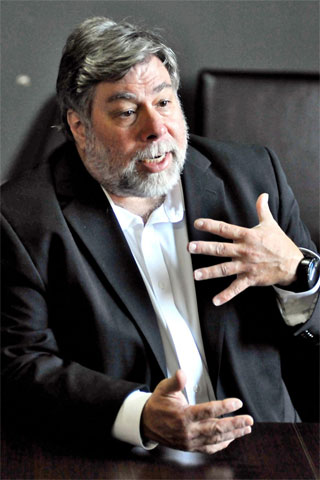
Since doing so in the 1970s with Steve Jobs, Wozniak has turned much of his attention, time, and money to education and new businesses. Presently serving as chief scientist at flash storage company Fusion-io, he also readily invests in new technologies and applications. "The best things that capture your imagination are ones you hadn't thought of before, and that aren't talked about in the news all the time," says Wozniak.
High on the list of ideal candidates are apps that take a smarter approach to the use of human speech, ones "where you talk to it like a normal person, the way you would talk to a human being."
"I want to be able to speak with errors in my wording, errors in my grammar," he continues. "When you type things into Google search, it corrects your words. With speech, I want it to be general enough, smart enough, to know 'no, he couldn't have meant these words that I think he said. He must have really meant something similar.' That's going to take a lot of software, a lot of artificial intelligence work over the next five to 10 years."
Another technology being predicted to develop over that period is the smart watch. One research group has suggested shipments of smart watches in 2014 could hit 8.9 million globally, hitting 214 million units by 2018. But Wozniak has already identified that the current models are too restrictive.
"I want the entire smartphone, the entire Internet, on my wrist," he says. "I want a larger display than they're starting with. They're starting with [...] displays that are the size of the iPod nano, which is the size of an ordinary watch of the past. I think we've got to get a little beyond this watch of the past.
"I hope [a future smart watch is] independent, works on its own, and is not connected with Bluetooth to the smartphone in your pocket," he adds. "But that doesn't mean it would be bad if it were that way."
Another notable product that will no doubt see considerable development over the next five years is Google Glass, and Wozniak's view on the system is pretty cut and dry. "I think that has a chance too, and the reason is: I want one. I don't have one because I haven't enough time to be an early tester.
"I think that's where our biggest innovations come from. It's people looking back at themselves and saying, 'Here's something that I really want that doesn't exist. I'm going to make it, maybe just for myself and my company.'"
With a pair of new iPhones just launched from Apple, it's difficult not to ask Wozniak his view on the new models. "I haven't seen [the 5C] too much because it wasn't very attractive to me," he explains. "You know what, a lot of Apple products, you've got to hold it in your hand and you get a whole different view of it. I've only just seen pictures online. So I'm not a good judge, but nothing grabbed my attention like a lot of Apple products.
"I'm usually interested in the more high-end anyway, and I love the looks [of] the iPhone 4 and the 5; I just love the looks and the beauty of the product. So the 5S is more like that. All it means is, 'Oh gosh, now I've got to get three new phones to get the three 5S colors.'
"So I'm not turned on by the 5C, but hey, maybe that's where a huge market is and I'm just not the person."
Steve Wozniak will be appearing at Apps World on October 23, speaking on stage with Wired.co.uk's editor Nate Lanxon. It's free to attend. To find out more and to book to attend, consult the Apps World website.
This story originally appeared on Wired UK.
reader comments
75